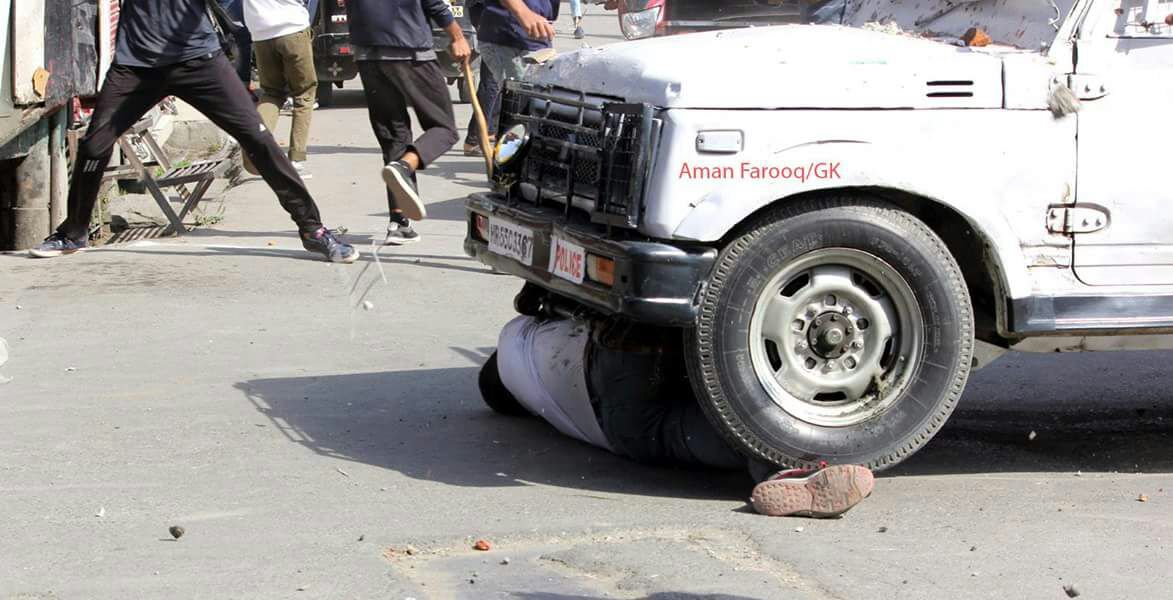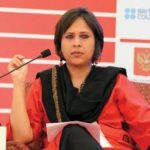
Indian journalists questioning the mowing down of Kashmiri youth under the CRPF vehicle
Srinagar: As part of a propagandist narrative, some Indian journalists in a desperate attempt tried to questions professionalism of Kashmiri journalists following the mowing down of two Kashmiri civilians by a driver of a paramilitary CRPF vehicle on Friday in Nowhatta, Srinagar.
Jammu and Kashmir Police has since booked the CRPF driver under sections 279 and 337 of the RPC for rash driving after one civilian Kaiser succumbed to his injuries after being mowed down in a ruthless manner.
The police have also lodged a case against unidentified youth accused of throwing stones for rioting and attempt to murder in connection with the violence that erupted in Srinagar city after mandatory Friday prayers in historic Jamia Masjid.
Mufti Islah, senior television journalist from Kashmir, hit back at some Indian journalists known for their one-sided and biased commentary on the Kashmir conflict, some of whom questioned integrity of Kashmiri journalists and their reporting on Kashmir affairs.

Kashmiri Journalist Mufti Islah
“Now some jokers will tell Kashmiri media men what journalism is? Barring a few – and the Kashmiri scribes acknowledge and respect them – the media men and women outside are PROs, agents, stenographers, party workers and maskharas masquerading as journalists. Dimwits, look within,” Islah said in a tweet while tagging J&K’s former chief minister Omar Abdullah, NDTV’s executive editor Nidhi Razdan, India’s star television anchors Rajdeep Sardesai and Barkha Dutt, senior Kashmiri journalist and commentator Gowhar Geelani besides others.
This tweet stirred up a debate online with more Kashmiri journalists joining in.
In another tweet, Islah wrote: “Kashmiri journalists have paid with their blood but held aloft the flag of fair and fearless journalism. Our tribe has lost dozen men to internecine violence. While the local reports from ground zero, the “parashoots” weave amazing fiction scripts. Sharam aati nahi magar.”
He continued: “And a ‘star ‘liberal parashoot who has been all along creating false equivalences between 10 civilian killings to a scratch on the face of a uniformed man suggesting ‘both sides of trench’ reporting. Wahwah.”
Shuja-ul-Haq, another television journalist from Kashmir, echoed the same views in a tweet: “Majority of the Kashmiri journalists are far better in objectivity. Reporting while living the conflict isn’t easy. Very easy though to pass judgements hundreds of miles away from the reality.”
Even an Indian journalist Pallavi Ghosh, who works as senior editor politics at CNNNews18, chose to side with Kashmiris by tweeting: “How I wish some of us in the media would leave Kashmir alone … our gyaan often makes things worse.”

Kashmiri Journalist Gowhar Geelani
Senior Kashmiri journalist Gowhar Geelani questioned ethics and professionalism of most Indian journalists covering Kashmir either from studios in Noida and Mumbai or trying to draw erroneous equivalence between violence perpetrated by armed forces and stone throwing incidents by the protesting civilians.
“Dear @islahmufti the parachuted scribes & self-styled Kashmir experts questioned Kashmir’s ethos, culture & social fabric when SAS Geelani did not open door to the visiting APD members, but they romanticise war crimes & rationalise killings of Kashmir’s young & blinding of a generation!,” he tweeted.
Independent Kashmiri journalist Sameer Yasir also joined in to suggest that most Indian scribes indulge in embedded journalism with little or no understanding of Kashmir’s ground reality.
Yasir wrote: “They (Indian journalists) know a lot of ground from the inside of paramilitary vehicles.”
“Embedded. They write script in Noida and then while being inside the armoured vehicles lose sleep to match their script with the footage on the ground. Then use the 2008 footage to tell the 2016 story. CLOWNS.,” Geelani wrote as a response to Yasir.
In another tweet, Geelani wrote: “A sample of professionalism set by Kashmiri journalists in last 30 years of deadly conflict: all K-journalists use ‘Militant/ rebel (not Mujahid) and the word ‘killed’ for both slain militants & Govt forces. Many Indian journalists use the word ‘Martyr’ for fallen soldiers.”
On 23 May, Indian journalist Barkha Dutt in a surprising move had tried to portray Kashmiris as “extremists” in a tweet which she immediately deleted after a powerful counter from Kashmiri journalists, especially Mufti Islah.

Barkha Dutt
In another tweet, Barkha had tried to justify Indian Army’s notorious Major Gogoi’s act of booking a hotel with a woman in Srinagar in Ramzan while posing as a businessman.
She later deleted that tweet too.
She also lost her cool while resorted to unnecessary diatribe against Mufti Islah after the latter had objected at attempts made by the former to portray Kashmiris as “extremists”.
Islah had responded by writing this: “Don’t blame Kashmiris needlessly and I being one am taking strong exception to what you have written. Kashmiris are peace loving, secular, accommodative and most hospitable despite the continual tragedies they have been facing. (https://twitter.com/BDUTT/status/999257743411286016 ….”
In the absence of an argument, Barkha called Islah a “clown”.
